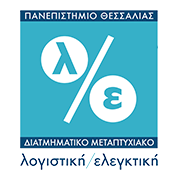Corporate Governance & Corporate Social Responsibility
(1) GENERAL
| SCHOOL | SCHOOL OF ECONOMICS AND BUSINESS | ||||
| SECTION | DEPARTMENT OF ECONOMICS AND DEPARTMENT OF ACCOUNTING & FINANCE | ||||
| LEVEL OF STUDIES | POSTGRADUATE LEVEL | ||||
| COURSE CODE | MA04 | SEMESTER OF STUDY | 3 | ||
| COURSE TITLE | CORPORATE GOVERNANCE & CORPORATE SOCIAL RESPONSIBILITY | ||||
|
INDEPENDENT TEACHING ACTIVITIES |
WEEKLY TEACHING HOURS | CREDIT UNITS | |||
| LECTURES | 3 | 6 | |||
|
TYPE OF COURSE |
REQUIRED |
||||
| PREREQUISITE COURSES: | NO | ||||
| LANGUAGE OF TEACHING AND
EXAMINATION: |
GREEK / ENGLISH | ||||
| THE COURSE IS OFFERED TO ERASMUS STUDENTS | NO | ||||
| ELECTRONIC COURSE PAGE (URL) | https://eclass.uth.gr/ | ||||
| Upon successful completion of the course, the student will be able to:
• understands the conceptual framework of Corporate Governance (CG) and Corporate Social Responsibility (CSR) • understands the theoretical aspects of ED and CSR • understands the ethical problems of business action • develops creative thinking and critical faculties in the field of ED and CSR • understand the tools for quantifying the qualitative information provided through corporate governance and corporate social responsibility statements • understands the complex operating environment of the business. |
| Learning Outcomes |
(2) LEARNING OUTCOMES
| • Search, analysis and synthesis of data and information, using both the
necessary technologies • Decision-making • Autonomous work • Teamwork • Working in an international environment |
| General skills |
| • Working in an interdisciplinary environment
• Generating new research ideas • Respect for the natural environment • Demonstrate social, professional and ethical responsibility • Promoting free, creative and inductive thinking |
(3) COURSE CONTENT
This course aims to provide an understanding of the principles of good governance and corporate social responsibility. In particular, through this course students will
study the evolution and the role of corporate governance (CG) and Corporate Social Responsibility (CSR), in order to delve into these two fields of knowledge that have in common
the objective of maintaining business continuity (going concern) through accountability and responsibility. Upon completion of the course, students will be able to understand these two modern forms of communication between the company and its customers.
various stakeholders and to assess in practice the quality of the information conveyed through these texts (narrative disclosure).
In particular, during the course of the course the following modules will be covered:
- The evolution of ED, with emphasis on its theoretical aspects and the development of ED codes
- Ownership and the role of stakeholders, e.g. shareholders and stakeholders, institutional investors and family businesses
- The structure of the Board (role and tasks, committees and subcommittees, independence of non-executive directors and their contribution, evaluation of directors, diversity)
as well as the particularly important element of the performance and remuneration of directors
- The international application of ED, distinguishing the form of ED in continental Europe,
Central and Eastern Europe, Asia-Pacific and South Africa, Egypt, India and Brazil
- An introduction to CSR, with emphasis on important points such as value motives, theories, the concepts of “sustainability” and “sustainable development”
- CSR and the impact of globalisation
- The implementation of CSR, with emphasis on how it is implemented, CSR reporting, stakeholder management and engagement, and socially responsible investment
- CSR in developing countries as well as in smaller enterprises
- The impact and future of
- CSR in developing countries as well as in smaller enterprises
(4) TEACHING and LEARNING METHODS – EVALUATION
| METHOD OF DELIVERY | On Site & Distance learning – Hybrid room | |||
| USE OF INFORMATION AND COMMUNICATION TECHNOLOGIES | Use of a hybrid room that includes a large
a wall-mounted screen on which the participants are presented remotely. The connection to the course is made through the Microsoft Teams software, in which a camera is connected to the course. in the room is recorded and illustrated by the teacher. The attendance of the course is also done with the use of the Wacom digital pen, which ensures the interactivity of the lesson with notes that appear directly on the students’ screen.
In addition, slides are projected, use of the asynchronous education platform for the posting of course materials, students’ assignments and and communication between lecturers and students, search for electronic journals and resources. |
|||
| ORGANISATION OF TEACHING | Activity | Semester workload | ||
| Lectures | 36 | |||
| Study, preparation and presentation of activities |
110 |
|||
| Study and analysis of the literature
(preparation of lectures & exams) |
31 |
|||
| Final written examination | 3 | |||
| Total Course |
180 |
|||
| STUDENT ASSESSMENT | The assessment is in Greek or in English and consists of a written assignment (individual/group) (40%) and a written exam (60%) at the end of the semester. The examinations include essay development questions as well as
multiple choice questions. An oral examination is foreseen in special cases (e.g. certain cases of students with learning difficulties, etc.). |
|||
(5) RECOMMENDED-BIBLIOGRAPHY
| – Suggested Bibliography:
Bibliography in Greek language
• Blowfield, M. & Murray, A. (2021). Corporate social responsibility. Nicosia: Broken Hill Publishers Ltd. • Goergen, M. (2015). Corporate governance: An international perspective. An international perspective: publications. Duplication. |
|
Bibliography in English
– Larcker, D. & Tayan, B. (2021). corporate governance matters. 3rd Edition. U.S.: Pearson Education, INC. • Monks, R. & Minow, N. (2011). corporate governance. 5th Edition. U.S.: John Wiley & Sons, Ltd. • Tricker, B. (2019). corporate governance principles, policies and practices. u.s.: oxford. University Press. – Related journals:Business Ethics: a European Review Business Ethics Quarterly Corporate Governance: An International Review
Corporate Governance: The International Journal of Business in Society Journal of Business Ethics |
You may also like
Sustainable Accounting – Non-Financial Information
(1) GENERAL SCHOOL SCHOOL OF ECONOMICS AND BUSINESS SECTION DEPARTMENT OF ECONOMICS AND DEPARTMENT OF ACCOUNTING & FINANCE LEVEL OF STUDIES POSTGRADUATE LEVEL COURSE CODE MA09 SEMESTER OF STUDY 3 …
Money and Capital Markets
(1) GENERAL SCHOOL SCHOOL OF ECONOMICS AND BUSINESS SECTION DEPARTMENT OF ECONOMICS AND DEPARTMENT OF ACCOUNTING & FINANCE LEVEL OF STUDIES POSTGRADUATE LEVEL COURSE CODE MA34 SEMESTER OF STUDY 3 …

